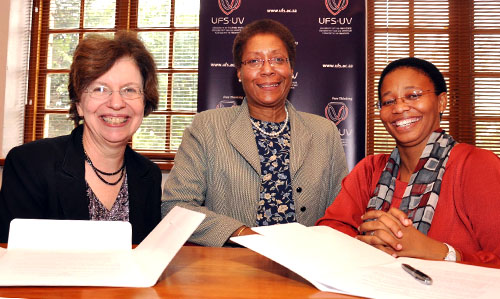Latest News Archive
Please select Category, Year, and then Month to display items
12 October 2020
|
Story Arina Engelbrecht
|
Photo Supplied
 Arina Engelbrecht from Organisational Development and Employee Well-being believes physical activity has a number of benefits for one’s health, including stress relief.
Arina Engelbrecht from Organisational Development and Employee Well-being believes physical activity has a number of benefits for one’s health, including stress relief.
Being physically active plays a big role in preventing the development of mental-health problems and in improving the quality of life of people experiencing mental-health problems.
Treatment for depression
Physical activity can be an alternative treatment for depression. It can be used as a stand-alone treatment or in combination with medication and/or psychological therapy. It promotes all kinds of changes in the brain, including neural growth, reduced inflammation, and new activity patterns are formed that promote feelings of calm and well-being. It releases endorphins – powerful chemicals in the brain that energise your spirit and make you feel good.
Physical activity can be very effective in relieving stress. Research in adults has found that physically active individuals tend to have lower stress levels compared to individuals who are less active. It also leads to improved sleep. When a person sleeps better and feels more rested, overall quality of life improves. They cope better with daily life stressors.
Reduce Alzheimer's risk
Regular physical activity can reduce your risk of developing Alzheimer's disease by up to 50%. It can also slow down further deterioration in those who have already started to develop cognitive problems. It stimulates the brain’s ability to maintain old connections as well as to make new ones.
A study asked people to rate their mood immediately after periods of physical activity (e.g. going for a walk/run, cycling, doing housework) and periods of inactivity (e.g. reading a book or watching television). Researchers found that participants felt more content, more awake, and calmer after being physically active compared to after periods of inactivity.
In conclusion, people who are physically active feel a sense of well-being, feel more energetic throughout the day, sleep better at night, have sharper memories, and feel more relaxed and positive about themselves and their lives.
“Being physically active not only changes your body, it changes your mind,
attitude, and your mood.” – Arina Engelbrecht
UFS signs MOU with Binghamton University
2011-04-20
 |
| Dr Kathrine Krebs, Vice Provost for International Affairs and Director of the Office of International Programs at Binghamton University New York, Prof. Josephine Allen from Cornell University New York, and Dr Choice Makhetha, Vice-Rector: External Relations (acting) from the UFS, signing the MOU between the UFS and Binghamton University. |
The University of the Free State (UFS) signed a Memorandum of Understanding with the Binghamton University to work together to develop academic and cultural interchanges, scientific research and other activities.
According to Dr Choice Makhetha, Vice-Rector: External Operations (acting) from the UFS, Binghamton University has hosted students in the Student Leadership Programme from the UFS in 2010 and will host another group in 2011. A group of social-work students from Binghamton University will also visit the UFS in 2011.
Other activities between the UFS and Binghamton University will include the identification of topics for joint research, followed by research activities; mutual invitations for faculty members to teach courses, conduct research, present lectures or participate in conferences, symposia and seminars; and staff exchange for institutional development purposes.